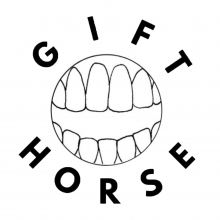About
Gift Horse Theatre is a Dublin-based company founded in 2018 by Signe Lury, Elishka Lane Barnes, Doris de Vries, Mae Leahy, and Ciara Berkeley. Gift Horse explores stories past and present as part of a playful, forward-thinking, environmentally-conscious theatre practice. Our debut production 'Tess,' an adaptation of Hardy's 'Tess of the d'Urbervilles,' took place in the Rose Garden in Trinity College Dublin in May 2019, celebrating and responding to its natural performance space.
Mission Statement
Gift Horse brings an environmentally-conscious practice to everything we do: we champion inclusive, ensemble-based work and believe that we have to extend those principles of consideration and respect to the environment. We believe eco-theatre should embrace theatricality, celebrating how it's made rather than trying to hide it. Our style is playful, bold, mischievous, and inquisitive. We love to work with adapted text as it allows us the freedom to practice a dynamic, self-aware, and multi-disciplinary approach. We are constantly looking for new ways of brining texts to life and love to incorporate dance, original music, puppetry, and more. We believe that the text is a springboard for play, a place from which to collaborate and experiment.
Ways that Gift Horse has already practiced “green” theatre
- Gift Horse strongly opposes fast fashion and only uses costumes that can be sourced second-hand, from cast or crew, or borrowed. We make sure to keep items for reuse in the future, or find them a new home. - We use natural materials in our design where possible, and otherwise either use recycled materials or materials that can be recycled/repurposed after a show. - We champion open-air theatre. Outdoor theatre lends itself well to environmentally-conscious practice, reducing the need for excessive electricity and encouraging us to look to natural spaces for their innate design possibilities. It encourages audience, actors, and production team alike to respect their natural environment, and creates its own unique atmosphere of togetherness and playfulness. - We had an outdoor, Covid-safe tour of 'Tess' scheduled for gardens across Ireland's South East in 2020 (cancelled at the last minute due to new Covid restrictions). For the tour, we focussed on three counties to keep our travel impact low and planned to donate a portion of our funds to carbon offsetting the journeys we did make. We planned to camp during the tour as another method of energy-saving. - We do not use paper tickets, and use recycled paper for posters and flyers where possible.
Ways that Gift Horse has already used their productions to highlight local or global ecological issues- This is something that Gift Horse looks to develop in our future work. As we grow as a company we plan to engage further with communities in the performance spaces we use, with their environments and ways that we can protect or serve these environments. We would love to engage with specific natural spaces in Ireland, their histories and their futures, as well as researching work we can do further afield. - 'Tess' looked at nature in dialogue with increasing industrialisation, as well as the natural environment as a home and site of protection. - 'Dr Faustus' (a production indefinitely postponed due to Covid) was to consider eco-hubris and the ways in which we often forego our ecological conscience for immediate or superficial pleasures.
Gift Horse's Ecological Goals
Gift Horse is one of the few theatre companies in Ireland who champion environmentally-conscious practice. We want to bring eco-theatre into the mainstream, and show that sustainable design can still be over-the-top, exciting, and beautiful. We are keen to embrace imperfection and continuous learning: we are a young company, and we are constantly looking to see how we can take more environmentally-conscious measures, how we can better share our message, how we can weave our ethos into all the shows we make. Eco-theatre started as a grassroots movement and we want to celebrate the importance of starting small, and of setting a new precedent. We'd love to learn more about ways of making every aspect of running a company environmentally-conscious: the admin work, the rehearsal process, the staging of shows, and the aftermath. We'd love to hear from companies who have successfully merged research and practice to create ecologically-minded shows that feel authentic and that represent a variety of voices, especially shows that are reimaginings of old texts but that have brought research and a specific ecological message to the work. It would also be amazing to hear from people who have experience setting up eco-theatre networks as we try to expand our eco-theatrical contacts in Ireland and develop a community between them.

